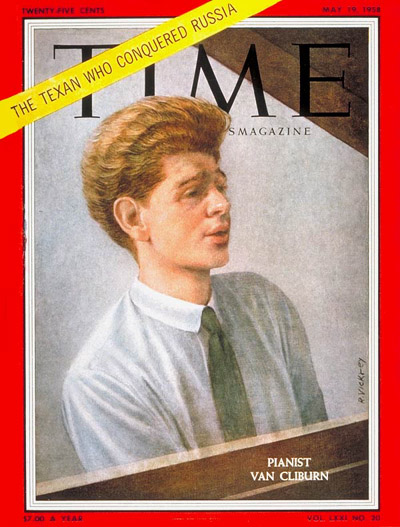Fewer and fewer people can say that they heard Van Cliburn play a solo recital. I did, in Kansas City in 1978, not long before he retired from the concert stage, and it was one of the most impressive musical experiences of my life.
 Not that he did anything unusual: the program consisted of familiar pieces by Brahms, Beethoven, Chopin, and Debussy that he’d recorded for RCA and played regularly from adolescence onward, and he interpreted them in a very “centric” way, devoid of mannerisms of any kind. Yet there was nothing impersonal about the way he played them. His tone was huge and rich, his rubato restrained and sensitive, his technique faultless. He was, I realized at once, a true artist.
Not that he did anything unusual: the program consisted of familiar pieces by Brahms, Beethoven, Chopin, and Debussy that he’d recorded for RCA and played regularly from adolescence onward, and he interpreted them in a very “centric” way, devoid of mannerisms of any kind. Yet there was nothing impersonal about the way he played them. His tone was huge and rich, his rubato restrained and sensitive, his technique faultless. He was, I realized at once, a true artist.
It wasn’t enough, of course. He’d become unimaginably famous at the age of twenty-three after winning the Tchaikovsky Competition in Moscow at the height of the Cold War. Moreover, fame had complicated his life to a degree scarcely more imaginable, for Cliburn, who died today at the age of seventy-eight, was a deeply closeted Eisenhower-era homosexual who lived in Texas and went to church every Sunday. To be a celebrity under such circumstances was an invitation to unhappiness. It didn’t help that he had an inexplicable incuriosity about music. The pieces that he learned as a student were for the most part the pieces he played in concert for the rest of his career. He was great, but he stopped growing, and before long he stopped performing as well.
Now that he’s gone, it seems safe to say that a frank biography will soon be published, one that seeks to disentangle the sad complexities of his private life. I’ll read it, but I’ll be more inclined to revisit his records, a fair number of which are as good as any that have ever been made by a classical pianist. (I especially like this one.) In the long run, that’s what will matter most about Van Cliburn. The rest, as they say, is history.
* * *
Tim Page’s Washington Post obituary is here.
Anthony Tommasini’s New York Times obituary is here.
Van Cliburn plays Liszt’s Twelfth Hungarian Rhapsody, one of the few works in his concert repertoire that he never recorded commercially:
